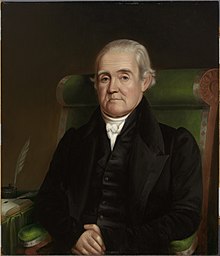About Noah Webster

Noah Webster was born in Hartford, CT, in 1758. He died in New Haven, CT, in 1843.
He had a successful career as a teacher. And a secondary career as a politician. But the great thing he did was his work as a lexicographer. He was the Webster behind the Merriam-Webster Dictionary.
After the US won its independence in 1776, Webster noticed that there was something in the post-revolutionary air of the country that wanted even more separation from the old world. In almost every aspect of human endeavor, from law to business to arts and politics, Americans – Webster included – wanted to do things differently than they had been done under English rule. And so, he devoted a good part of the rest of his life to chronicling that development in an area he was particularly interested in: language.
His ambition was to publish a dictionary of American English that identified all the ways it was moving away from British English. One relatively easy task was to record orthographic changes, such as changing the spelling of “honour” to “honor” and “centre” to “center.”
But the real challenge was to create a dictionary that was actually better in many ways than the best-known English dictionaries that existed at the time, such as Robert Cawdrey’s A Table Alphabeticall (1604) and Samuel Johnson’s Dictionary of the English Language (1755). And that meant digging into the history of the English language and its already vast and complicated evolution from Old English through Middle English to Modern English and finally to Modern American English.
To accomplish this ambitious task, he must have been working 18 hours a day for decades. For example, to examine the etymology of the words he included, he learned 28 languages (at least the basis), including Old English, Sanskrit, and Russian.
At 70 years old, he finally published his masterpiece. The two-volume tome defined 70,000 words, 12,000 of which had never been in a dictionary before. It has been printed in four editions since its initial publication, and remains one of the most influential reference books in history.
The next time someone tells me I should be kicking back and enjoying my 70s, I’m going to tell them about all the things I’ve not yet done… and then I’ll tell them the story of Noah Webster.
 MarkFord
MarkFord